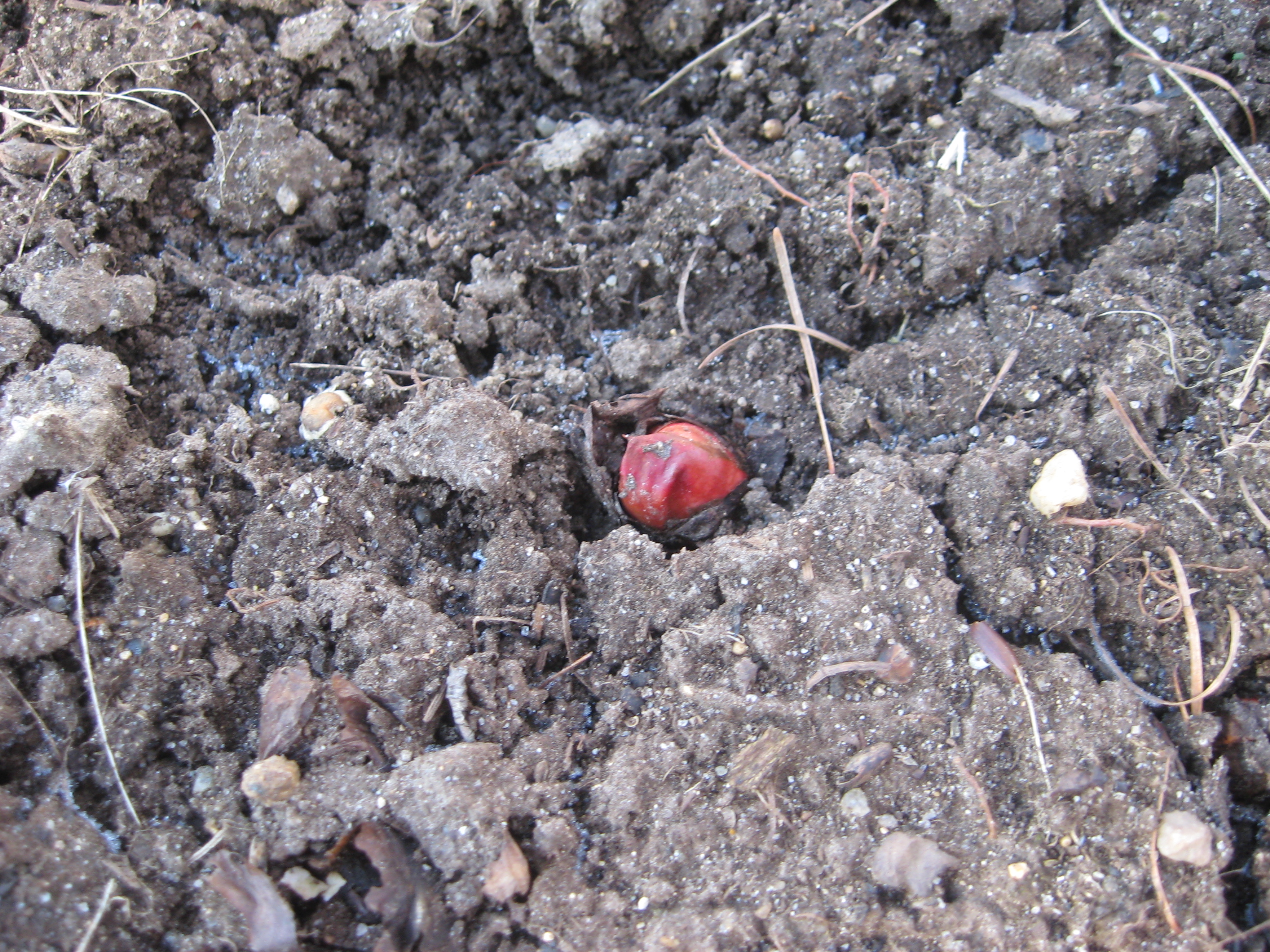Yes, it’s neither March nor April, Chaucer fans, but with the arrival of February’s leap day, let’s take a walk to the paradise garden and see how this year’s absent winter has prepared us for spring. Before you know it, we’ll be tracking mud in the house.
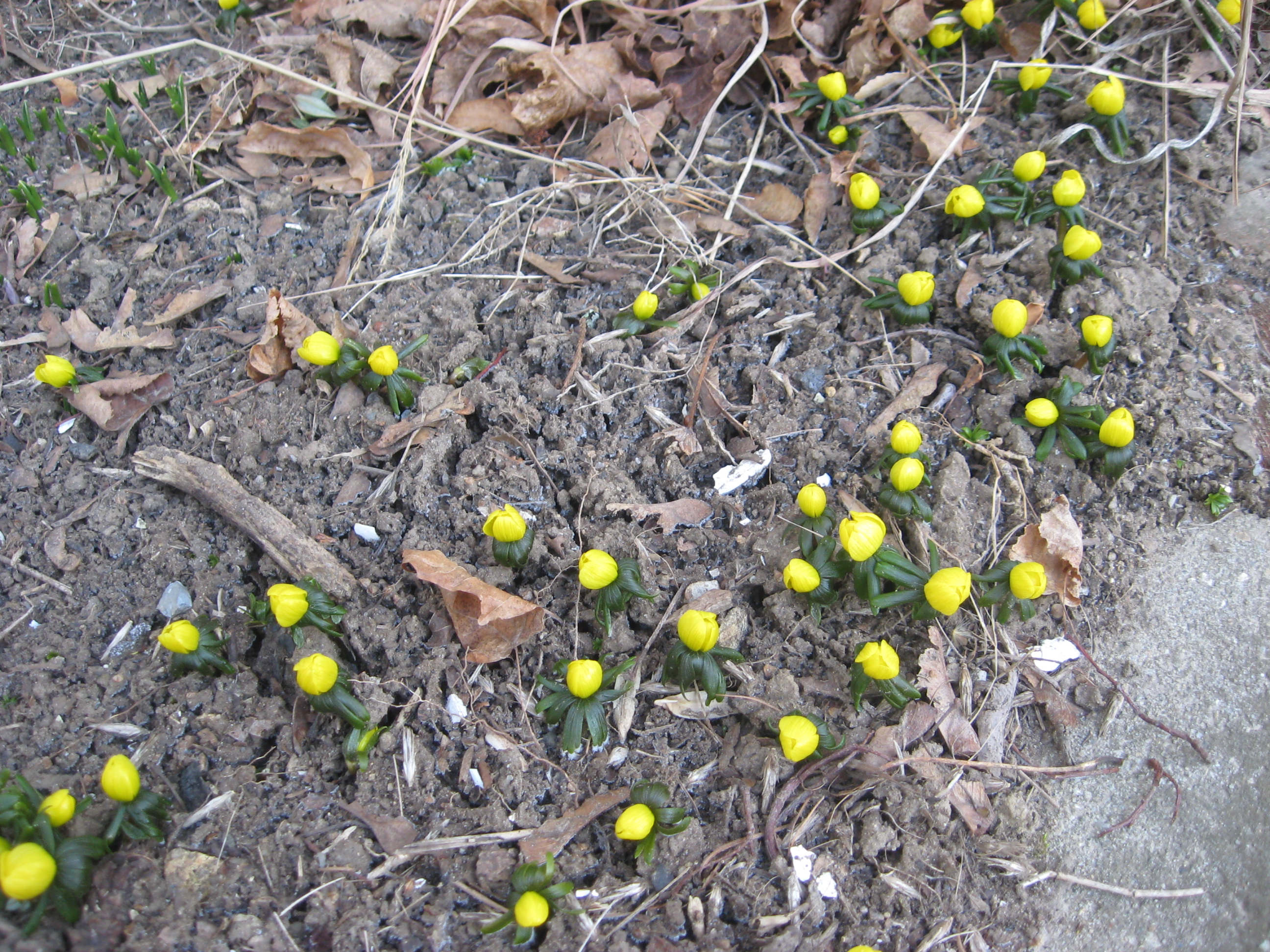
Winter aconite, growing on the edge of the garden by our back door. The sun hasn't hit them yet, so they're clenching their fists.
William Robinson, the great Irish gardener and writer, praised this wee plant, the harbinger of spring, in his 1870 book, “The Wild Garden: or, Our groves and gardens made beautiful by the naturalisation of hardy exotic plants; being one way onwards from the dark ages of flower gardening”:
“The Winter Aconite (Eranthis hyemalis) should be naturalised in every country seat in Britain–it is as easy to do so as to introduce thistle. It may be placed quite under the branches of deciduous trees, will come up and flower when the trees are naked, will have its foliage developed before the leaves come on the trees, and be afterwards hidden from sight. Thus masses of this earliest flower may be grown without the slightest sacrifice of space, and only be noticed when bearing a bloom on every little stem.”
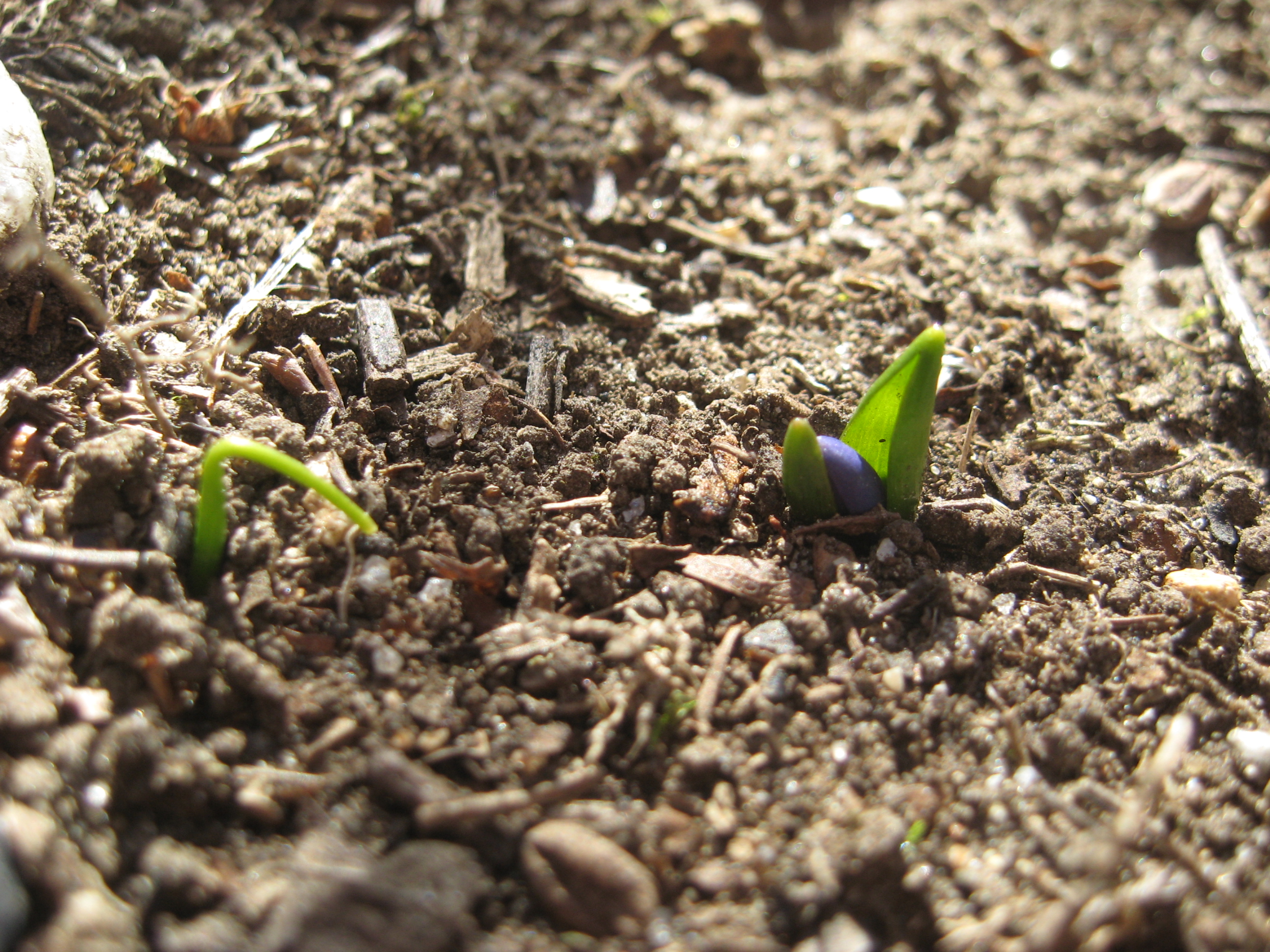
A squill emerges from the warming soil. The genus is scilla, and there are scores of species. This purple infant is likely siberica.
Why the squill, such a delicately designed flower, is named for a vicious six-headed, twelve-legged sea monster in Greek mythology, I don’t know. Scylla makes a notable appearance in Book XII of Homer’s The Odyssey, when she gobbles alive six of Odysseus’ men. Here is the scene in Allen Mandelbaum’s nimble translation (1990):
But just then,
Scylla seized six–the strongest–of my men;
she snatched them from the hollow ship; and when
I turned my eyes to seek my friends,
all I could see were feet and hands on high.
They called my name aloud for the last time
and shrieked in anguish. As a fisherman [250]
who, from a jutting rock, has cast his bits
of food as bait to snare small fish, lets down
into the sea his long rod tipped with horn,
and when she’s made a catch will whip it back–
writhing; so were my men whirled through the air,
writhing, against the rocks. There, at the door
to her deep cavern, Scylla swallowed them
as, in their horrid struggle, my dear friends
stretched out to me their hands–the saddest sight
my eyes have ever seen in all that I
have suffered in my journeys on the sea.
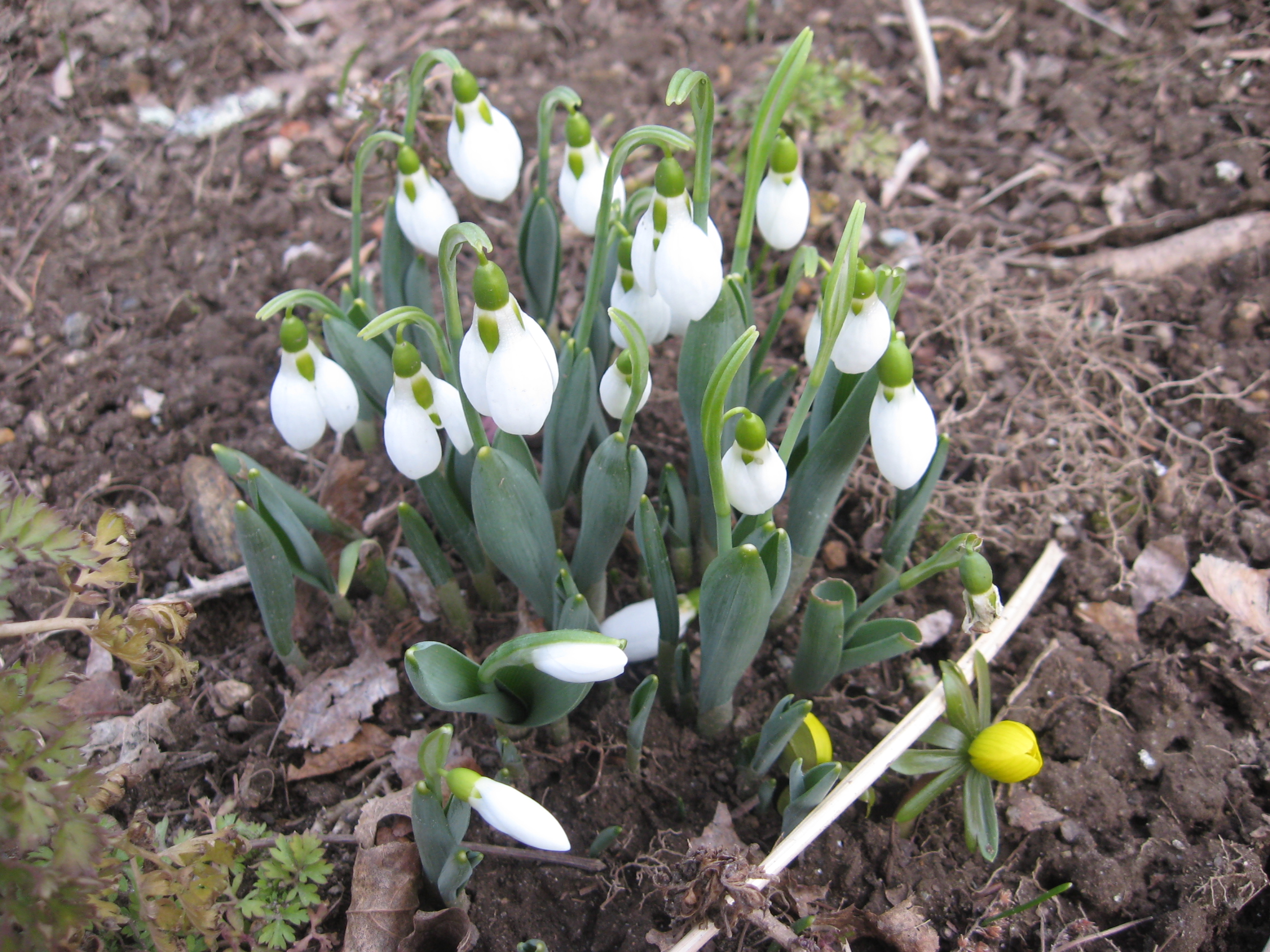
A pair of aconites hold their own against an onslaught of snowdrops. Part of the Amaryllis family, the genus Galanthus (Greek for "milk flower") is another beloved herald of spring.
Interestingly, Galanthus, like Scylla, makes an appearance in The Odyssey, in Book X, when Hermes counsels Odysseus on how to escape from the lair of Circe, who had drugged him and his crew into forgetfulness. Again, Mandelbaum:
“But come, I’ll save you from her snares, I’ll thwart
her plans. Now, when you enter Circe’s halls,
don’t leave behind this tutelary herb.
I’ll tell you all her fatal stratagems:
She’ll mix a potion for you; she’ll add drugs
into that drink; but even with their force,
she can’t bewitch you; for the noble herb
I’ll give you now will baffle all her plots…..”
When that was said, he gave his herb to me;
he plucked it from the ground and showed what sort
of plant it was. Its root was black; its flower [400]
was white as milk. It’s moly for the gods….
Some scholars maintain that the plant described by Homer is purely fictitious, while others believe it is a type of hellebore. Most, by my reckoning, identify it as Galanthus nivalis. If you’d like to take a fascinating walk down this road, check out this article (1983) in the journal Clinical Neuropharmacology, which posits that because Galanthus nivalis contains galanthamine, a “centrally acting anticholinesterase” that blocks nerve impulses, “the description of ‘moly’ as an antidote in Homer’s Odyssey may represent the oldest recorded use of an anticholinesterase to reverse central anticholinergic intoxication.” Remarkably, Galanthamine has been used in the treatment of Alzheimer’s disease. Way to go, Homer.
Nearby in Nonnie’s garden, the hellebore makes its appearance, as the “Christmas rose,” Helleborus niger.
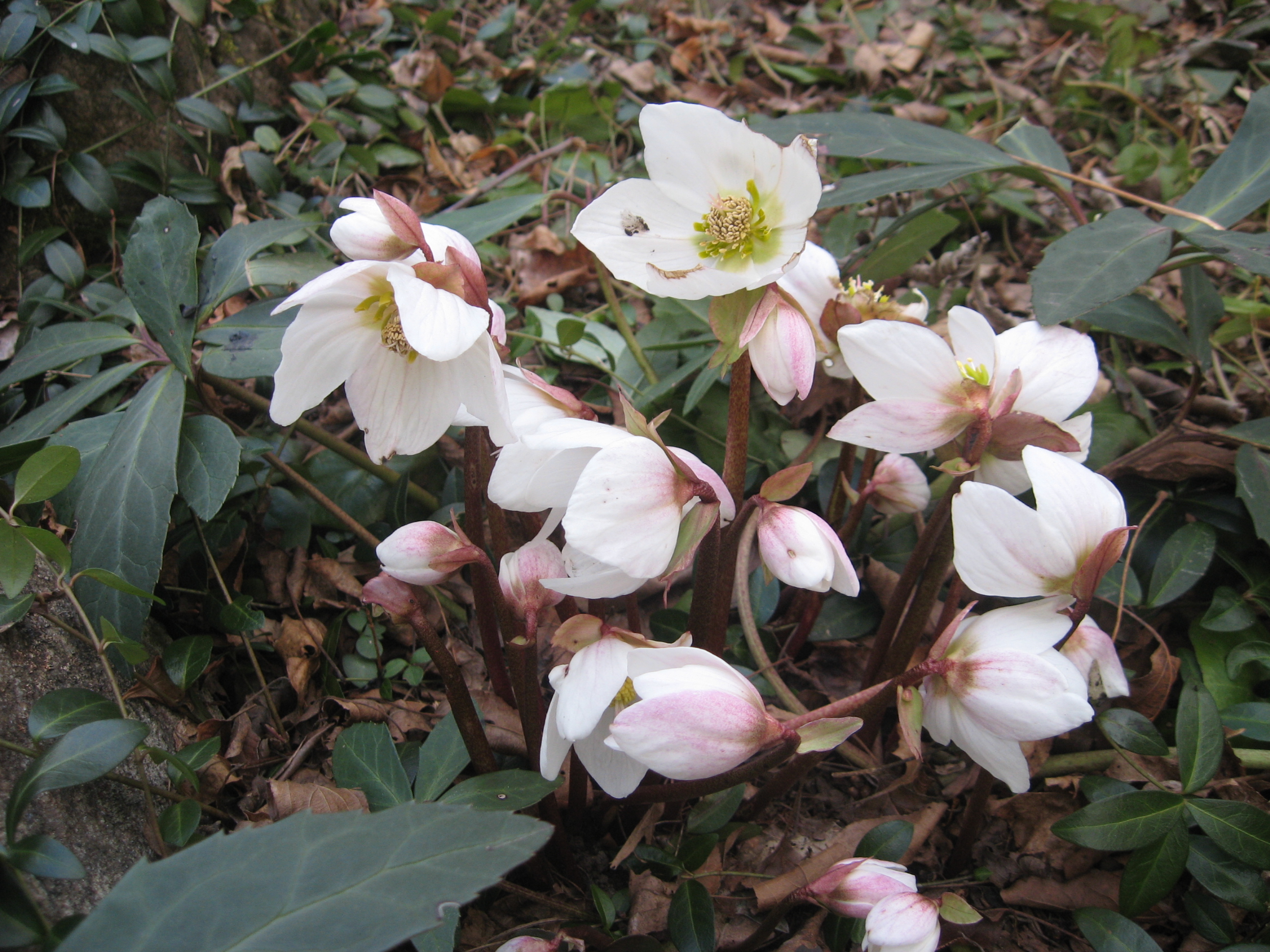
Helleborus niger has been used in the past as an herbal medicine. The English botanist John Parkinson (1567-1650) said that it is "good for mad and furious men, for melancholy, dull and heavie persons, and briefly for all those with blacke choler, and molested with melancholy."
This was the garden’s first plant to flower in winter. A beauty. And here’s a rival for our affection, Rheum rhubarbarum. Does any plant have more fun in a pie?
I can find no reference to rhubarb in Homer. However, Bear Creek Winery, in Homer, Alaska, produces a rhubarb wine. Here’s a closer look at the crimson nubbin.
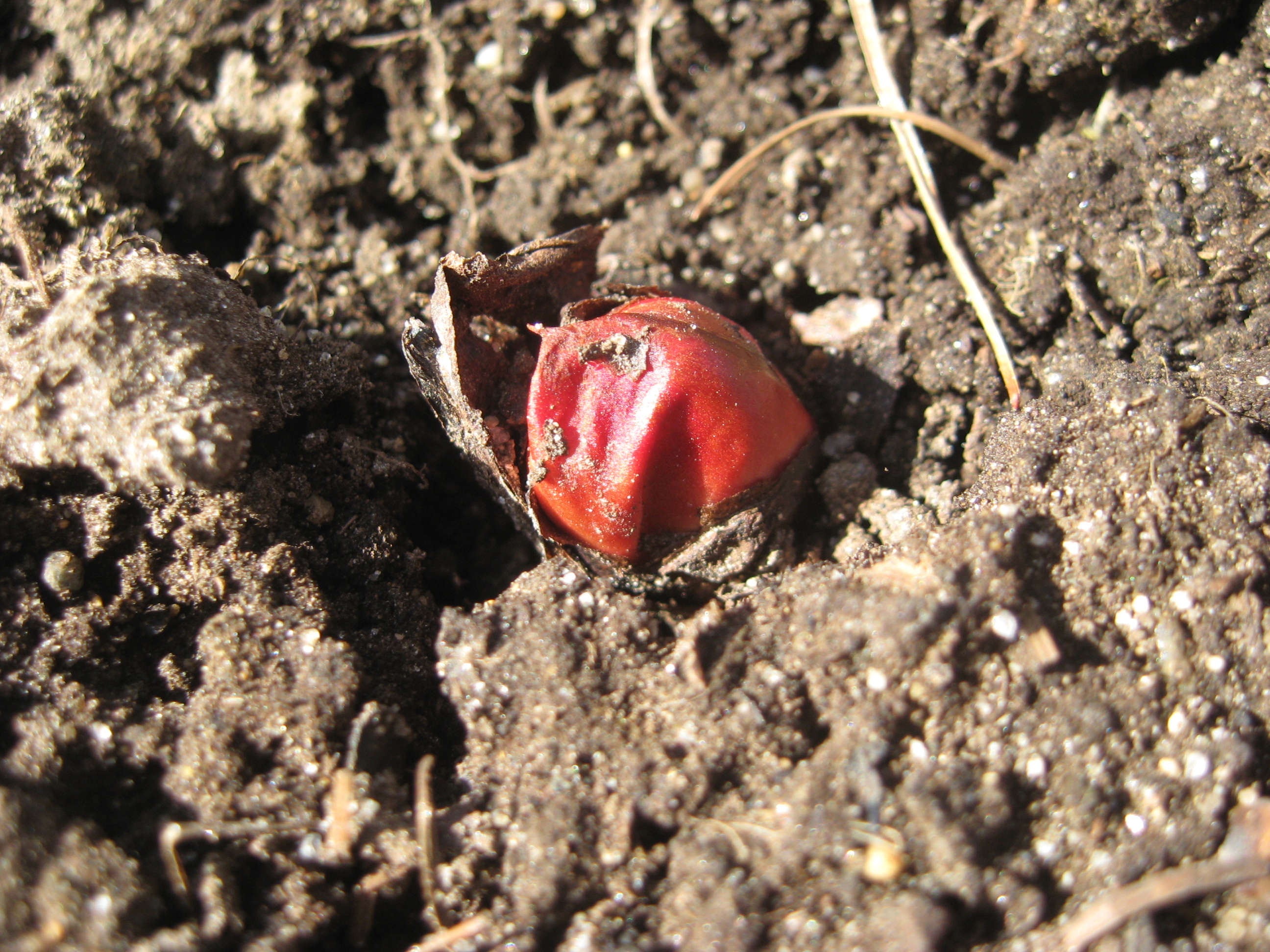
Evident, as Dylan Thomas put it, is "the force that through the green fuse drives the flower." A miracle.
It is proper, right, and just to give Shakespeare the last word on affairs of the garden, as in affairs of the heart. Yes, he mentions rhubarb, in, of all places, Macbeth (Act V, Scene 3).
Enter SEYTON
Seyton
What is your gracious pleasure?
Macbeth
What news more?
Seyton
All is confirm’d, my lord, which was reported.
Macbeth
I’ll fight till from my bones my flesh be hack’d.
Give me my armour.
Seyton
‘Tis not needed yet.
Macbeth
I’ll put it on.
Send out more horses; skirr the country round;
Hang those that talk of fear. Give me mine armour.
How does your patient, doctor?
Doctor
Not so sick, my lord,
As she is troubled with thick coming fancies,
That keep her from her rest.
Macbeth
Cure her of that.
Canst thou not minister to a mind diseased,
Pluck from the memory a rooted sorrow,
Raze out the written troubles of the brain
And with some sweet oblivious antidote
Cleanse the stuff’d bosom of that perilous stuff
Which weighs upon the heart?
Doctor
Therein the patient
Must minister to himself.
Macbeth
Throw physic to the dogs; I’ll none of it.
Come, put mine armour on; give me my staff.
Seyton, send out. Doctor, the thanes fly from me.
Come, sir, dispatch. If thou couldst, doctor, cast
The water of my land, find her disease,
And purge it to a sound and pristine health,
I would applaud thee to the very echo,
That should applaud again.–Pull’t off, I say.–
What rhubarb, cyme, or what purgative drug,
Would scour these English hence? Hear’st thou of them?
Doctor
Ay, my good lord; your royal preparation
Makes us hear something.
Macbeth
Bring it after me.
I will not be afraid of death and bane,
Till Birnam forest come to Dunsinane.
Doctor
[Aside] Were I from Dunsinane away and clear,
Profit again should hardly draw me here.
Exeunt.


